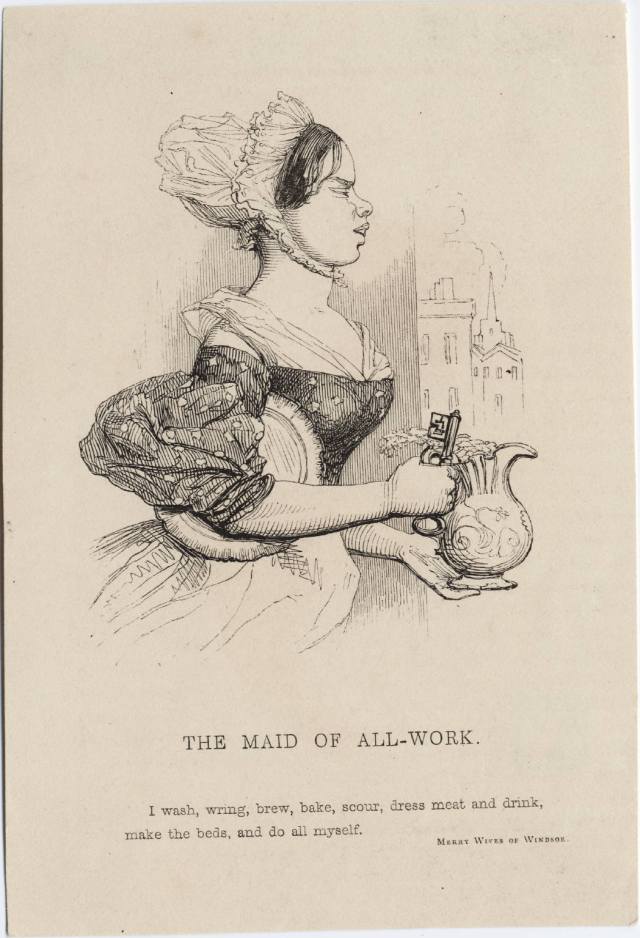
Many of our posts take a look at the upper echelons of Georgian society, so this time we thought it might be interesting to look at what it would have been like to have worked ‘below stairs’ as a housemaid in a Georgian household: it’s not quite Downton Abbey though!
Although these duties weren’t written until towards the end of the Georgian era, the workload would more than likely have been the same for the previous hundred years or more. Having taken a look, our conclusion is that it’s certainly not a job for us, what do you think? To learn about the duties of a laundrymaid click on the link.
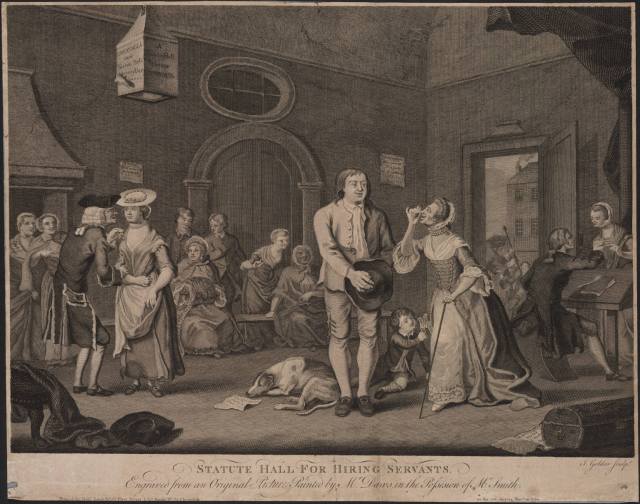
Qualifications
A housemaid should be active, clean, and neat in her person. Be an early riser, of a respectful and steady deportment, and possessed of a temper that will not be easily ruffled. She must be able to see without much appearance of discomposure her labours often increased by the carelessness and thoughtlessness of others.
Many a dirty foot will obtrude itself upon her clean floors; and the well-polished furniture will demand her strength and patience, when spotted or soiled by some reckless hand.
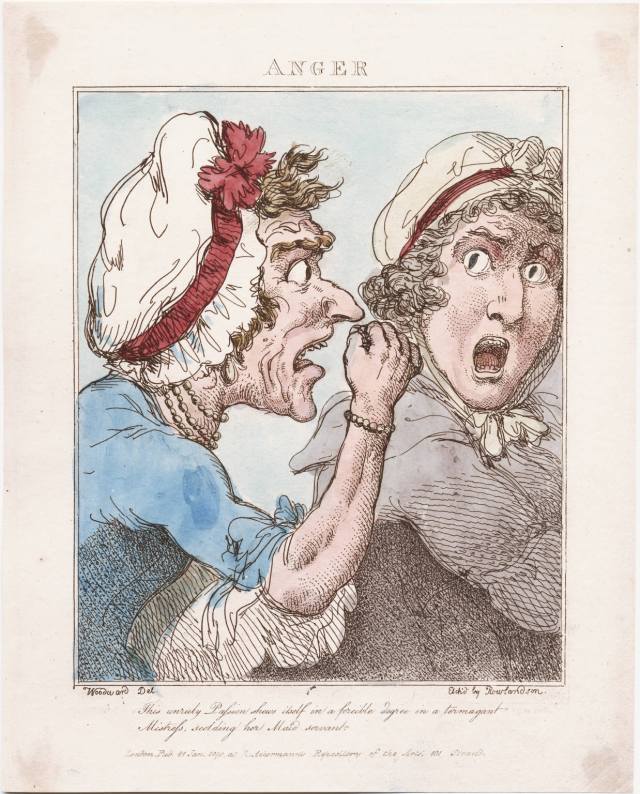
Duties
The sitting rooms in daily use are first to be prepared. Upon entering the room in the morning, the housemaid should immediately open the windows to admit the fresh air. She should then remove the fender and rug from the fire-place, and cover, with a coarse cloth, the marble hearth, while the ashes and cinders are collected together and removed. The grate and fire-irons are afterwards to be carefully cleaned. If the grate has bright bars, it should be rubbed with fine emery paper, which will remove the burnt appearance of the bars. Fine polished fire-irons, if not suffered to rust, will only require to be well rubbed with a leather.
The carpet should be swept with the carpet broom not oftener than once a week, as the more frequent use of the broom would wear the carpet too fast but, each day, it should be swept with a good hair broom, after it has been sprinkled with moist tea leaves. Sofas and any other nice furniture should be covered over with a large calico cloth, kept for that purpose before the sweeping commences; and window curtains should be hung up as high as they can be out of the way of the dust. After the carpet is swept, the dust must be removed, either with a soft round brush, or with a very clean linen duster, from the panels of the doors, the windows and window frames, ledges, and skirting boards. The frames of pictures and looking-glasses should never be touched with linen, but the dust should be cleared from them with a painter’s brush, or a bunch of feathers.
Where footmen are kept, the charge of rubbing mahogany furniture devolves on them, otherwise, it becomes the care of the housemaid. The chairs and tables should be rubbed well every day and on the mahogany tables, a little cold drawn linseed oil should be rubbed in once or twice a week, which will, in time, give them a durable varnish, such as will prevent there being spotted or injured by being accidentally wetted. Bees-wax should not be used, as it gives a disagreeable stickiness to everything, and ultimately becomes opaque. When there are any spots or stains upon a table, they must be washed off with warm water before the oil is put on.
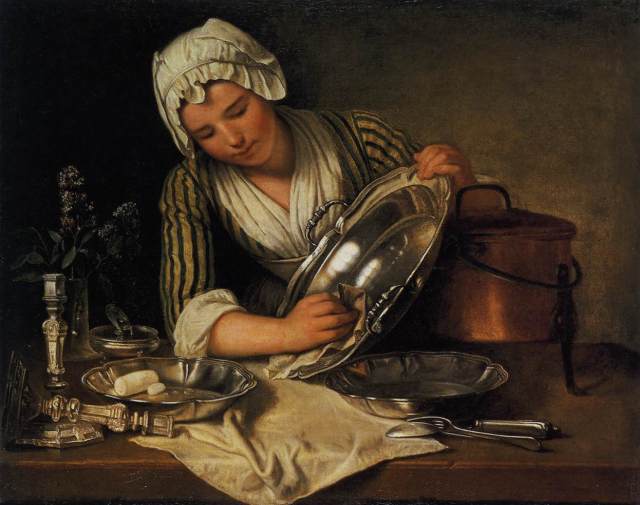
The chimney-ornaments, glass-lustres, or China, should be very carefully removed while the mantel-piece is either washed or dusted; and as the housemaid replaces them, she should, with a clean duster, wipe them free from the dust. The window-curtains are then to be dusted with a feather broom, and properly replaced on the hook.
About once a week the sills of the windows should be washed with soap and water, and the windows cleaned from the dust everywhere within reach.
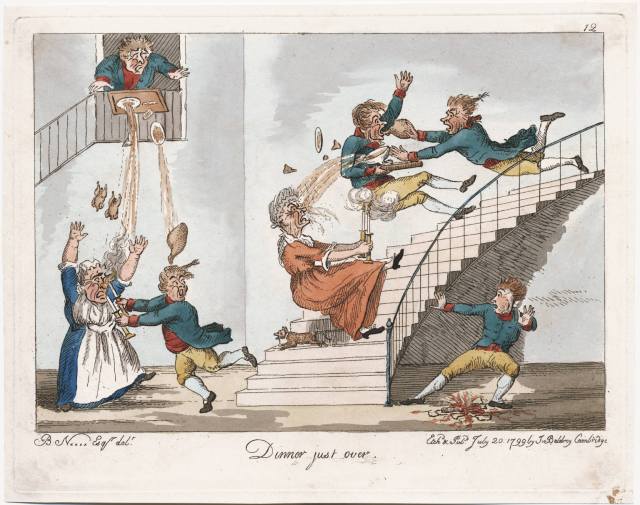
The stairs and stair-carpets should next be swept down if time will allow this duty before breakfast, as it is not a pleasant thing to be done when the family are moving about. And whenever good opportunities occur, such as the chief part of the family being absent from home for a few hours, the housemaid should avail herself of these to take the stair carpets up, and have them well beaten and shaken, while she scours the stairs down, and rubs the brass wires bright. The wainscot-board should also be washed, and the bannisters and hand-rail well rubbed.
As soon as the different members of the family are assembled at breakfast, the housemaid should repair to the bed-chambers, open the windows (unless the weather be damp), draw the curtains up to the head of the bed, and throw the bed-clothes upon two chairs placed at the foot of each bed, and leave the feather-beds open to the air.
When this has been done in all the rooms in use, she should then bring her chamber-bucket, with a jug of hot water, and with the proper towels, empty and clean out all the chamber-vessels in each room, and then instantly carry off, empty, and wash out the bucket, and turn it down in some appropriate place, that the water may completely runoff from it. When quite dry, she will, of course, carry it to the closet appointed for her use, in which she keeps her brooms, brushes, and the rest of her cleaning apparatus. She should next carry water-jugs, one with soft water and another with pump-water, into every bedroom, and fill the water-ewers and decanters.
The towels should be put before an open window to dry or be changed, and the washing table put into complete order. The beds, which during this time have been left exposed to the air, have now to be made, and in this another of the female servants should be appointed to help her, as the feather ones cannot be well shaken, or the mattresses turned, by one person. It is very necessary that feather-beds should be well shaken, or the feathers will knot together, and render the bed hard and uncomfortable. Once or twice a week the paillasses should be turned, and every day the flock-mattresses and the beds. The sacking-cloth and bedstead should be dusted occasionally.
It is necessary to remind those who are called from other household work to assist in making the beds, that they should previously wash their hands, as nothing looks more untidy or disgusting than the marks of dirty fingers upon the bed hangings, sheets, or counterpanes. With cleanly servant, this can seldom occur.
The beds being made, the curtains are to be shaken and laid upon the bolster, and a large calico coverlet should be thrown over the whole, and coarse towels over the washing and dressing-tables. If the bed carpets are small and loose, they should be taken up before the beds are made; but if they are fastened down, which is very customary now, damp tea-leaves should be strewed over them previous to their being swept with a stout hairbrush. After the room is swept, a damp mop or flannel, passed under the beds, the chests of drawers and wardrobes collects the flue and dust, and this should be done every day, as the best mode of keeping bed-rooms free from troublesome insects of every kind. A clean mop should belong to the housemaid for this purpose. Nothing betrays an untidy housemaid more than the flue being suffered to accumulate beneath the beds. After the room is swept, the ledges, panels of doors, and window frames are all to be dusted, and the furniture rubbed and dusted.
Twice during the week bedroom carpets should be taken up and shaken, and the floors under them swept free from dust, and occasionally scoured. In the country, scouring is not so frequently done as in town, but the floors are oftener dry-rubbed.
In winter, a bedroom should never be scoured, unless the weather be mild and dry, for nothing is so likely to injure health as damp in a bedroom. As soon as a housemaid thinks she has finished a room, she ought to look around her and examine if she has omitted anything, which will show care and attention, and prevent her mistress from being obliged to call her up, to admonish her of any neglect.
During the winter, when there are fires in the bedrooms, the housemaid should, before sweeping the room, collect and carry away the ashes, clean the grate and fire-irons, and lay, with small pieces of wood, a neat fire, ready to be lighted either before dinner or at night, according to orders.
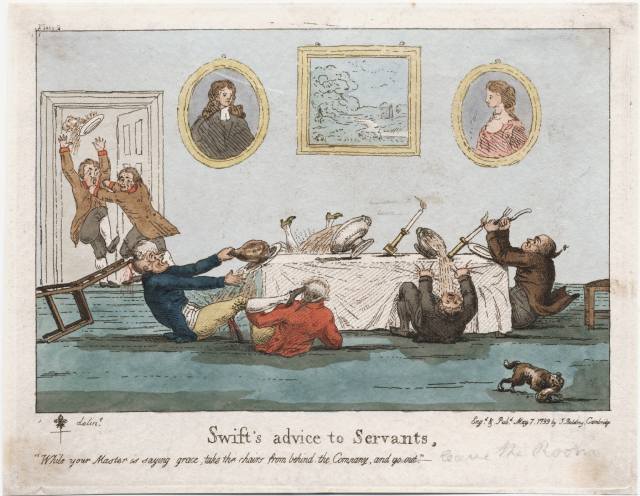
While the family are at dinner, the housemaid should again repair to the dressing and bedrooms, to put in order those things which have been used and disarranged at the dressing hour. Between the time of her own dinner and tea, she ought to be employed in sewing, perhaps in repairing the household linen, or in any work appointed for her.
Early in the evening, the beds should be turned down, the windows shut, the curtains drawn, the fires, if required, lighted, and the rooms are prepared for the night.


Very interesting. What is the source? Or did I read over it?
LikeLike
Thank you, so pleased it was of interest. No you didn’t read over it, it’s a 2 part blog and the source for both will be in the second part, it’s from ‘Domestic duties : or, Instructions to young married ladies, on the management of their households, and the regulation of their conduct in the various relations and duties of married life by Mrs Parkes’. 🙂
LikeLiked by 1 person
Open fires create a LOT of dust, which finds its way everywhere [I have open fires as my sole heating source]. Boy am I glad of carpet sweepers and vacuum cleaners. Incidentally, I have tried the wet tealeaf treatment before brushing, and never found it very effective. It’s supposed to attract dirt, stains and smells, but a sprinkle of bicarbonate of soda works better.
LikeLike
I have open fires too & totally agree. I think some of the ideas about cleaning are perhaps best left in the 18th century 🙂
LikeLike
Agreed about the tea leaves – they left wet splotches and trails but did nothing for helping to pick up dust. A wet cloth did much better and using that meant no chance for any tannins from the tea leaves to stain anything.
LikeLiked by 1 person
Reblogged this on AustenBlog and commented:
We are having Dorothy make note of these cleaning tips.
LikeLiked by 1 person
How lucky was the family that could afford servants! The rest must have tolerated a good deal of dirt.
LikeLiked by 1 person
Pingback: Life below stairs – the duties of a Georgian housemaid | All Things Georgian | First Night History
Terrific post. Thank you for the reminder of what life was like for those below stairs.
LikeLike
Thank you so much, we’re delighted that you found it interesting. Life below stairs would have been extremely arduous with exceptionally long days. It would undoubtedly have been much the same for the laundrymaid as you will see from our blog post. 🙂
LikeLike
Wonderfully informative post! Thank you.
LikeLike
So pleased that you enjoyed it 🙂
LikeLike
Thanks for writing a post on this side of the Georgian world. We hardly think of it when we think of anything period. Do tell us the source.
LikeLike
We’re delighted that you enjoyed it and you’re quite correct, we tend to look at the ‘upper class’ their amazing clothes and lifestyle, it is easy to forget those who worked so incredibly hard ‘below stairs’. There is also a companion piece about the life of a laundry maid if you care to follow the link we’ve added near the beginning of the article. The source is ‘Domestic duties : or, Instructions to young married ladies, on the management of their households, and the regulation of their conduct in the various relations and duties of married life by Mrs Parkes’ 🙂
LikeLike
Great post ! I couldn’t even imagine keeping up with all of these chores and still have my mind intact 🙂
LikeLike
Thank you so very much, we really appreciate your comment. Life would have been incredibly hard with extremely long hours and little rest, not a life many of us today would be able to cope with!
If you follow the new link that we’ve added near to top of the article it will take you to the companion piece about the duties of the laundry maid, if the household didn’t warrant 2 individuals then the role of laundry maid would simply have been added to that of the housemaid – imagine trying to doing both jobs!
LikeLike
A great post
LikeLike
Thank you so much. We have another one in the series due out in the next few days 🙂
LikeLike
Pingback: Life below stairs – the duties of a Georgian housemaid | A PBS Exploration
Reblogged this on museumofmethodism.
LikeLike
The employment of female servants was widespread even into the Twentieth Century in Britain. They cost less to employ and many relatively modest households would have a female servant who might be expected to cook as well as clean and do the washing.
“The Gentleman’s Daughter” by Amanda Vickery makes clear that the servant problem was alive and well in the 18th Century with mistresses resorting to withholding wages or holding a servants trunk containing their possessions to prevent them leaving their service. One gets the impression that the relationship between master and servants became more formalised in the Nineteenth Century.
One thing you did not mention was the hazards a good looking female servant may encounter with male members of the family. Your article reproduces a couple of genre paintings & prints showing well dressed pretty maidservants works produced for the pleasure of men. Not all maidservants could hope that their master would be so enraptured that he would marry them unlike the heroine of “Pamela”.
Handsome young men would be employed as footmen and pretty young maids would be employed in roles where they would be seen or as personal servants. Those not favoured with good looks or good physique were more likely to finish up in the less attractive positions involving more hard work and drudgery.
LikeLike
Pingback: Keeping a Clean House Regency Style | Jane Austen's World